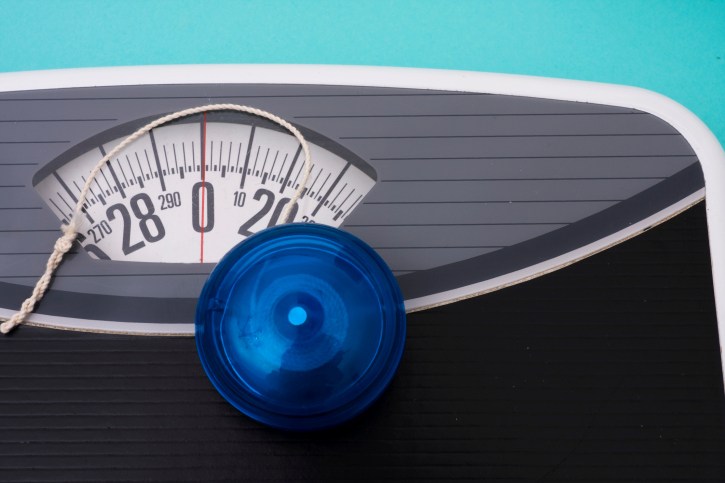The One Factor In Fertility I Wish More People Understood: An OB Explains

We all know that maintaining a healthy weight is important for preventing diseases and staying fit. But many people don't realize that weight can also affect your ability to have children. In fact, some 12 percent of all infertility cases are the result of a woman weighing too much or too little—and the man’s weight can be a factor, too.
As a reproductive endocrinologist and fertility expert, I wish more people knew these seven things about weight and infertility:
1. Your optimal weight for pregnancy success.
Since weight plays an important role in fertility, it’s important to know where you stand on the scale. Do you need to lose, gain, or maintain your weight?
The best way to assess this is to calculate your BMI, or body mass index. The optimal BMI range for a woman who wants to conceive is anywhere from 18.5 to 24.9. Women with a BMI of less than 18.5 are considered underweight while a BMI between 25 and 29 is considered overweight, and over 30 is obese.
2. Being overweight can hurt a woman’s fertility.
Carrying extra weight can interfere with healthy hormone levels, inhibiting conception. This is because having too much fat tissue can cause a woman to make too much estrogen. When that happens, the body begins to react as if it is on birth control, decreasing the chances of getting pregnant.
Having excess fat tissue can also increase abnormal lipid levels and cholesterol, discouraging healthy blood flow to the uterine lining. This makes it more difficult for a fertilized egg to implant in the uterine wall.
3. Being underweight can hurt a woman’s fertility.
While much has been said about the effects of obesity, being underweight can also cause problems when it comes to getting pregnant. Women with too little body fat can have problems producing enough estrogen. When that happens, a woman’s reproductive cycle begins to shut down. Like women who are overweight, underweight women can have irregular cycles in which ovulation does not occur or is inadequate.
4. Being overweight affects a man’s fertility, too.
The male partner’s weight is also a factor when it comes to having a child. Studies have found that low sperm counts and low sperm motility (movement) are more common in men who are overweight. Obesity may be associated with changes in testosterone levels and other hormones important for reproduction.
5. PCOS is associated with weight gain as well as infertility.
PCOS (polycystic ovarian syndrome) is a condition in which a woman's hormones are out of balance. It's common in young women (about 8 to 10 percent have it) and is a frequent cause of infertility.
While some women have a genetic predisposition in developing the illness, weight gain can also trigger it. About 50 percent of women who have PCOS are overweight. While not every woman with PCOS is overweight, many do have signs of insulin resistance. This can lead to a disruption in healthy hormone levels that interferes with ovulation and egg quality.
Exercise and following a low-calorie and low-carbohydrate diet may help lead to weight loss, menstrual cycles, and ovulation. Many women with PCOS, however, need additional treatment to achieve pregnancy. This can include medications to decrease insulin resistance and encourage ovulation.
6. Being overweight can hurt your chance of a healthy pregnancy.
Unfortunately, even after you get pregnant, being overweight can reduce your likelihood of a successful pregnancy. This is true even if you used IVF (in vitro fertilization) to get pregnant. Studies have found that obesity can negatively affect the embryo quality in women under 35 who have undergone IVF.
Women who are overweight have a higher rate of miscarriage and an increased risk for developing pregnancy-induced diabetes and high blood pressure. In addition, obese women have a higher chance of delivering by cesarean section.
7. Losing even just a little weight can increase your fertility.
The good news is that dropping just 5 to 10 percent of your body weight can increase your chances of having a baby.
Following a healthy diet can go a long way in maintaining a healthy weight. Increase your intake of complex carbohydrates such as vegetables and whole grains and limit refined carbohydrates such as white bread and sweets. This will improve fertility by balancing hormones and normalizing blood sugar and insulin levels.
Exercise is also key. Try to spend at least 150 minutes a week doing moderate-intensity aerobic exercise such as walking, or 75 minutes per week doing a more vigorous intensity exercise, like jogging. If you have concerns about your weight and fertility, consider seeing a reproductive endocrinologist.
Related reads:
- I'm An OB/GYN Struggling With Infertility. Here's Why I'm Finally Breaking My Silence
- 5 Foods To Eat To Boost Your Fertility
- What I Wish Every Couple Knew Before Starting IVF: An OB/GYN Gets Real
-
Weight Loss Supplements: The Good & The Bad
(BlackDoctor.org) — Just take a pill for it, right
-
What Should A Consumer Look For In Weight Loss Pills?
Do you know that you basically have plenty of choices for your weight
-
The Best Fat Loss Plans for Postpartum Moms
The nine months just flew by and now you are rocking your new bundl
-
Feed Your Superpowers: 5 Superfoods For More Energy & Vitality
When it comes to eating healthy, there’s levels to
-
Drink to Lose Excess weight: A appear on Fat loss Drinks for Guys
Belly excess fat is common amongst women, but far more likely among
-
The Original Fast Food Diet
Fast foods are not just a 20th century thing. They have been around si
- DON'T MISS
- Three Excellent Techniques That You Can Adopt To Drop Some Weight Fast
- 7 Weight Loss Motivation Tips
- 6 Diet Products To Avoid If You Want To Lose Weight
- Fat Loss Common Sense and a Little Science
- Eating disorders and depression incidence found to be higher in athletes
- Fighting The Shocking Statistics Of Childhood Obesity
- Las Vegas Weight Loss - Real Weigth Loss Solutions For Real People
- Finding Winter Workout Wear
- Alternative Diet Program for 2009
- Most effective Calorie Burning Diets




